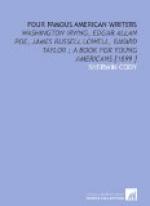This Parson Wilbur is almost as much of a character in the book as Hosea himself, and his prose, printed at the beginning and end of each poem in small type, is almost as clear and effective and interesting as Hosea’s poems. We are always tempted to skip anything printed in small type, and placed in brackets; but in this case that would be a great mistake.
Speaking of “What Mr. Robinson Thinks,” Parson Wilbur says, “A bad principle is comparatively harmless while it continues to be an abstraction, nor can the general mind comprehend it fully till it is printed in that large type which all men can read at sight, namely the life and character, the sayings and doings, of particular persons....
“Meanwhile, let us not forget that the aim of the true satirist is not to be severe upon persons, but only upon falsehood, and as Truth and Falsehood start from the same point, and sometimes even go along together for a little way, his business is to follow the path of the latter after it diverges, and to show her floundering in the bog at the end of it. Truth is quite beyond the reach of satire. There is so brave a simplicity in her, that she can no more be made ridiculous than an oak or a pine. The danger of the satirist is, that continual use may deaden his sensibility to the force of language. He becomes more and more liable to strike harder than he knows or intends. He may put on his boxing gloves, and yet forget that the older they grow, the more plainly may the knuckles inside be felt. Moreover, in the heat of contest, the eye is insensibly drawn to the crown of victory, whose tawdry tinsel glitters through the dust of the ring which obscures Truth’s wreath of simple leaves.”
There is another very interesting passage which is said to be an extract from one of the Parson’s sermons, describing the modern newspaper.
“Wonderful, to him that has eyes to see it rightly, is the newspaper. To me, for example, sitting on the critical front bench of the pit, in my study here in Jaalam, the advent of my weekly journal is as that of a strolling theater, or rather of a puppet-show, on whose stage, narrow as it is, the tragedy, comedy, and farce of life are played in little. Behold the huge earth sent to me hebdomidally in a brown paper wrapper.”
You see that what he says is very learned in its choice of words; but if you read it carefully you will find it interesting.
But after all, Parson Wilbur is a humorous character, though he has his sense, too. At the end of his introduction are some fragmentary notes which are intended as a general satire on editors of books. He goes on at some length to say that he thought he ought to have his picture printed in the book which he professes to be editing. But he has only two likenesses, one a black profile, the other a painting in which he is made cross-eyed. He speaks of it as “strabismus,” which sounds very learned of course, and he goes on to explain that in actual fact this is not a bad thing, for he can preach very directly at his congregation, and no one will think the preacher has him particularly in his eye. He also says Mrs. Wilbur objected to having a cross-eyed picture reproduced, and he is therefore driven to take the position of those great people who refuse to have their features copied at all. Then he puts in a lot of absurd genealogical notes.




